#Elizabeth Taylor Edward Albee
Text
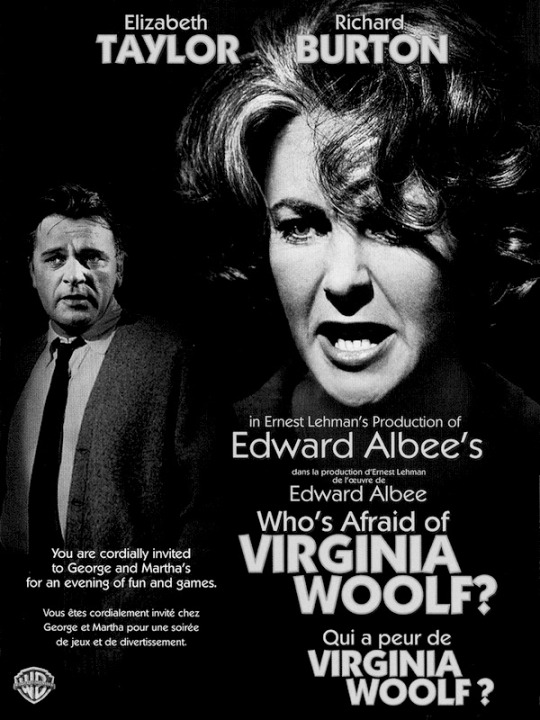
Currently Watching
WHO'S AFRAID OF VIRGINIA WOOLF?
Mike Nichols
USA, 1966
#watching#Elizabeth Taylor Edward Albee#Richard Burton#Sandy Dennis#Mike Nichols#George Segal#Alex North#Haskell Wexler#1966#all-time top ten#personal favorites#defining moments
7 notes
·
View notes
Text


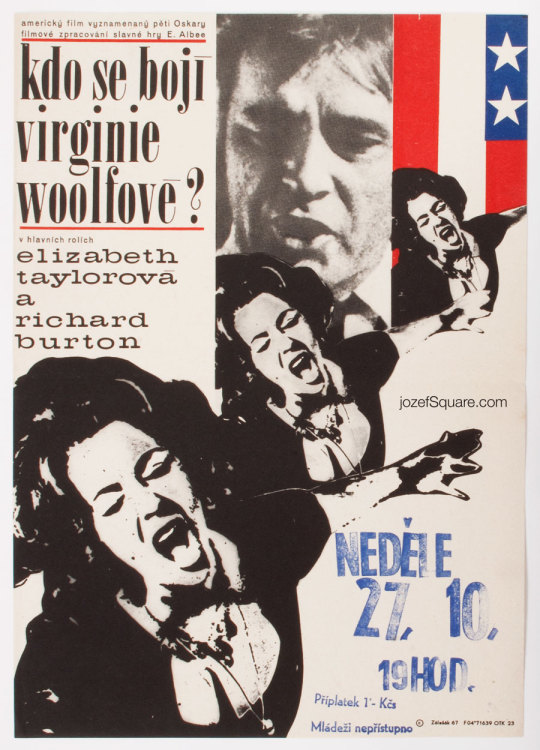
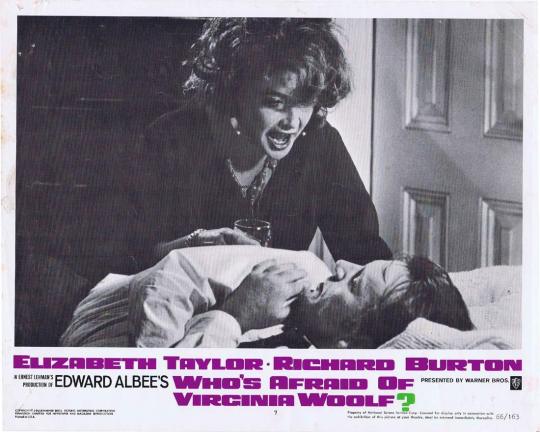
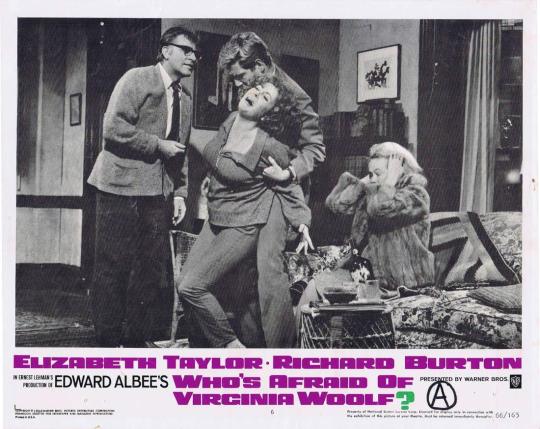
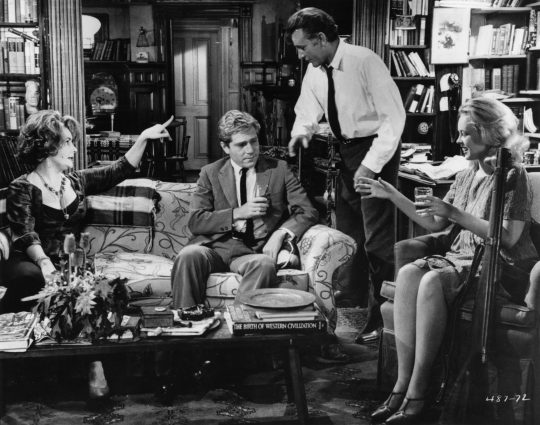
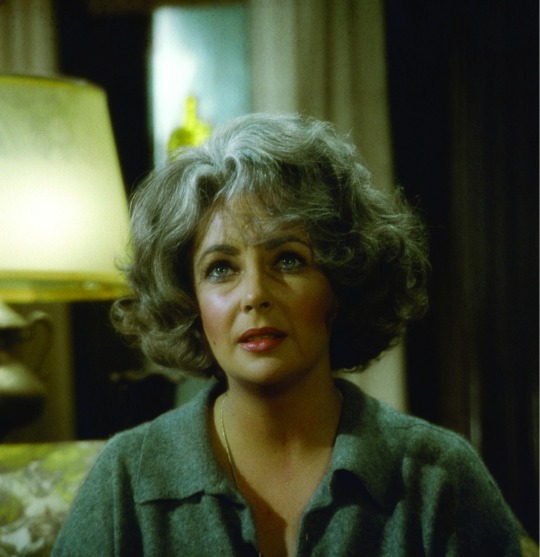


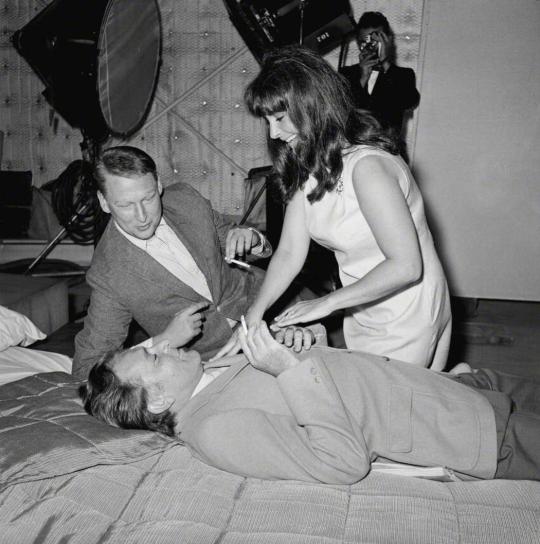
Who's Afraid of Virginia Woolf? (1966) Mike Nichols
March 16th 2024
#who's afraid of virginia woolf?#1966#mike nichols#elizabeth taylor#richard burton#george segal#sandy dennis#Edward Albee's Who's Afraid of Virginia Woolf?
15 notes
·
View notes
Text

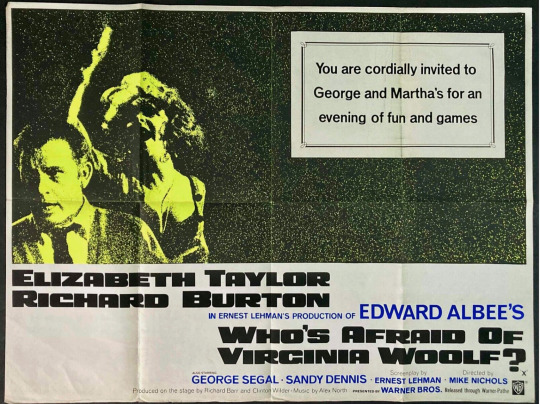
1966.
The Nashville Police arrested a theater manager for showing Who's Afraid of Virginia Woolf?
#who's afraid of virginia woolf?#richard burton#elizabeth taylor#edward albee#nashville#tennessee#censorship
13 notes
·
View notes
Text

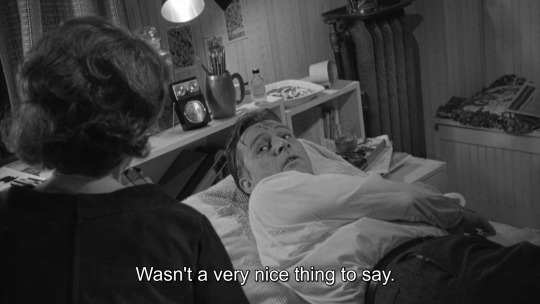


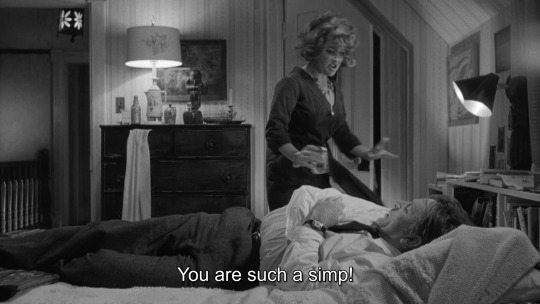

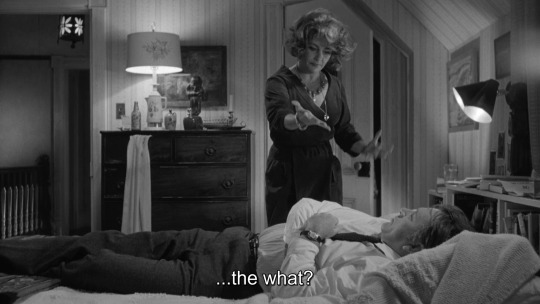

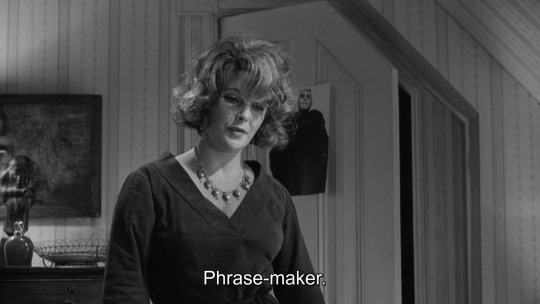
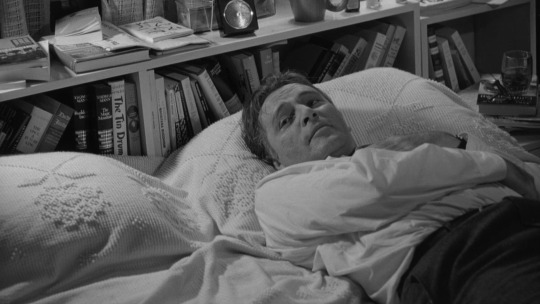

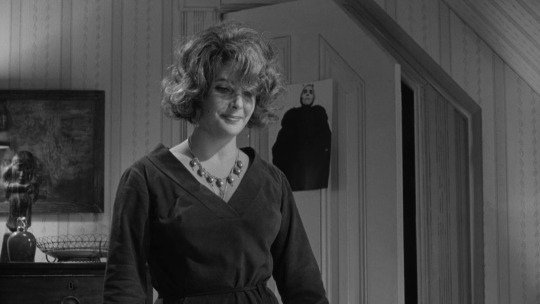
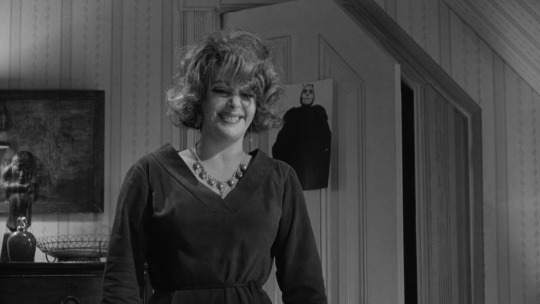
Who's afraid of Virginia Woolf?, 1966
#drama#who's afraid of virginia woolf?#mike nichols#ernest lehman#edward albee#elizabeth taylor#richard burton#connection
19 notes
·
View notes
Text
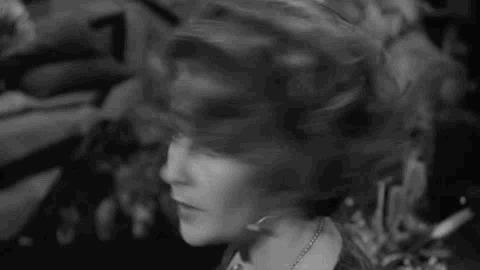
#theatre#edward albee#literature#b&w#eyes#1960s#retro#film#elizabeth taylor#hollywood#gif#cinematography#black and white#60s#cinema#movies#culture#who's afraid of virginia woolf?#people#filmmaking#🍿#mike nichols#haskell wexler#richard burton#george segal#sandy dennis#👀
92 notes
·
View notes
Photo
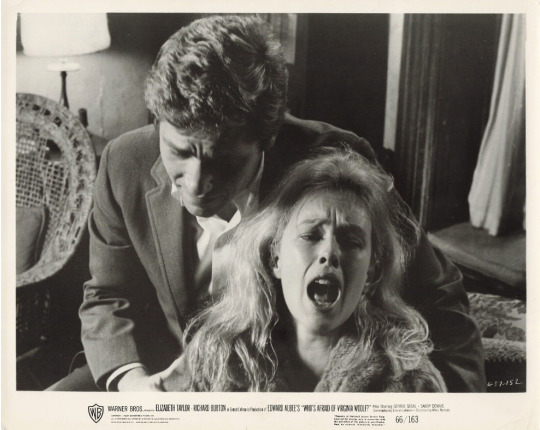
#op#who's afraid of virginia woolf?#edward albee#mike nichols#sandy dennis#elizabeth taylor#richard burton#classic cinema
8 notes
·
View notes
Photo
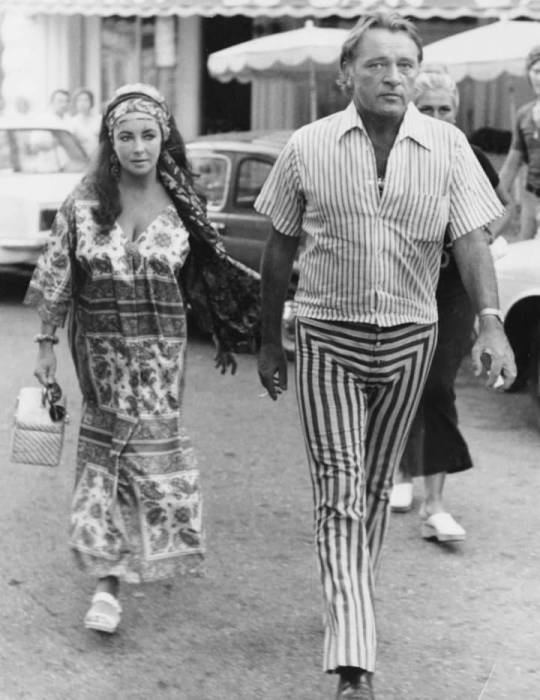
Liz Taylor and Richard Burton. The look on Burton’s face suggests he fully understands the fashion crime he is committing.
* * * *
“George who is out somewhere there in the dark... George who is good to me, and whom I revile; who understands me, and whom I push off; who can make me laugh, and I choke it back in my throat; who can hold me, at night, so that it's warm, and whom I will bite so there's blood; who keeps learning the games we play as quickly as I can change the rules; who can make me happy and I do not wish to be happy, and yes I do wish to be happy. George and Martha: sad, sad, sad... whom I will not forgive for having come to rest; for having seen me and having said: yes; this will do; who has made the hideous, the hurting, the insulting mistake of loving me and must be punished for it. George and Martha: sad, sad, sad... who tolerates, which is intolerable; who is kind, which is cruel; who understands, which is beyond comprehension...”
― Edward Albee, Who's Afraid of Virginia Woolf?
9 notes
·
View notes
Text

"Who's Afraid of Virginia Woolf?" (1966)
#edward albee#mike nichols#who's afraid of virginia woolf?#elizabeth taylor#richard burton#sandy dennis#george segal
4 notes
·
View notes
Text
Theory about "Who's Afraid Of Little Old Me?"
First of all, this theory isn't mine! I saw this video on Tik Tok of a Brazilian woman. I found it really interesting and decided to share it with you. She's an English teacher and her account on Tik Tok is @teachermaryhollywood. I could just post her video here, but she's speaking Portuguese in it, and I know the majority of my followers are English native or non-native speakers, so here I am to bring it translated to you.
If you are a non-native English speaker like me, let's learn something:
What's the meaning of "little old me"?
When you translate "Who's afraid of little old me?" to your native language, you may not realize how ironic this title is. If like me, you thought "little old me" was only a reference of age, you (and me) were wrong. "Little old me" is an English idiom and it is "a way of referring to yourself that is meant to be modest or self-deprecatory, though often fake".
"Who's afraid of little old me?" made lot of people remind of "Who's Afraid of Virginia Woolf?". But what are we talking about?
"Who's Afraid of Virginia Woolf?"
This is the title of a play written by the American Edward Albee which was first staged in 1962 and it was adapted to the cinema in 1966. The lead actors on the screen were Richard Burton and Elizabeth Taylor.
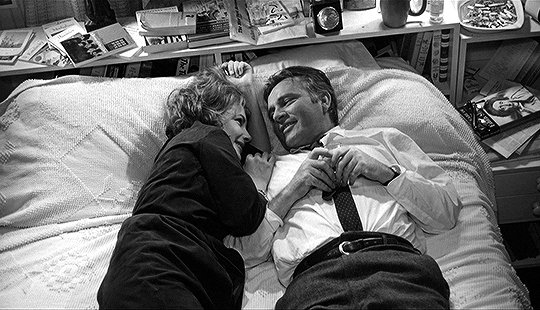
They starred together in 11 films and while they were together, their relationship was considered the "marriage of the century" by the media. When we talk about this couple, does it remind you of something?
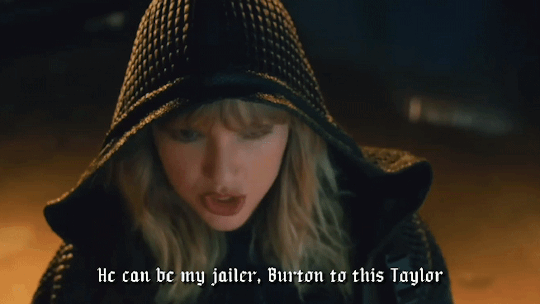
When Taylor Swift released the reputation album, we believe that the majority of the songs, inclunding "...Ready For It?" were written about a specific person. We also believe that The Tortured Poets Department will talk about the same person...
Back to the play... its title is a pun on the song "Who's Afraid of the Big Bad Wolf?" from Walt Disney's Three Little Pigs from 1933.
youtube
A nice pun happens here with the word "wolf" and the surname "Woolf". There's a scene where Elizabeth Taylor sings the line "Who's afraid of Virginia Woolf?" in the same way the little pigs sing "Who's afraid of the big bad wolf?" in the Disney film.
The play/film focus on the middle-aged couple Martha and George. They have a toxic relationship. George is a professor in a university. One evening after a university faculty party, they receive a younger couple, Nick and Honey as guests and the rest is chaos...
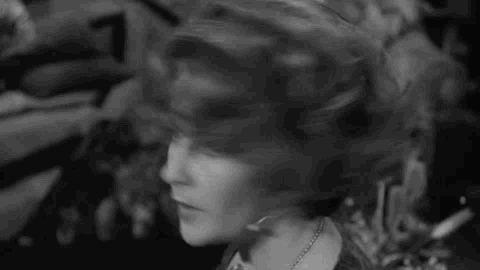
But who is Virginia Woolf?
Virginia Woolf was an English writer who began writing professionally in 1900. She is considered one of the most important modernist 20th-century authors. She pioneered the use of stream of consciousness as a narrative device. Stream of consciousness is a narrative mode or method that attempts "to depict the multitudinous thoughts and feelings which pass through the mind" of a narrator. She used to depict the truth of her characters in a special way.

Concluding part
But why are we talking about all those things? Well, in the play/film Martha and George live in a big illusion. This means that when they ask: "who's afraid of Virginia Woolf?", they're asking "who's afraid of... the truth?". So when Taylor asks: "who's afraid of little old me?", she can be asking "who's afraid of the truth?"
It's important to remind you one more time: This is just a theory that ISN'T MINE. It's from @teachermaryhollywood available on her account on Tik Tok.
Taylor can be asking another thing. Let's wait to hear the song and create more theories because this is so representative of us and our fandom.
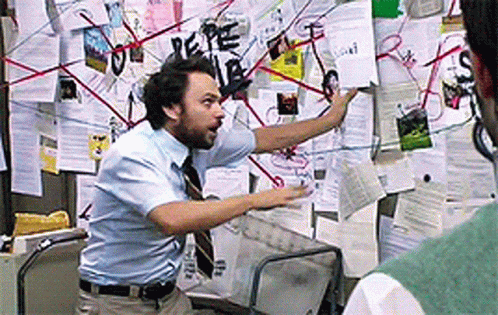
Main source: (x)
Extra source: (x) (x) (x)
#Youtube#taylor swift#taylorswift#tswift#tswiftgifs#ready for it#ts ttpd#ttpd era#ttpd#the tortured poets department#who's afraid of little old me?#who's afraid of virginia woolf?#tswiftgif#tswiftedit#tik tok#ts theories#swiftie theories#swifties
8 notes
·
View notes
Text

Currently Reading
COCKTAILS WITH GEORGE AND MARTHA
Movies, Marriage, and the Making of Who's Afraid of Virginia Woolf?
Philip Gefter (2024)
#reading#books on film#Elizabeth Taylor#Richard Burton#Edward Albee#Mike Nichols#Sandy Dennis#George Segal#Philip Gefter#books on films#2024
1 note
·
View note
Text
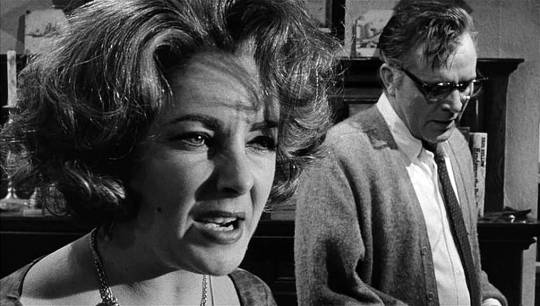
Elizabeth Taylor and Richard Burton in Who's Afraid of Virginia Woolf? (Mike Nichols, 1966)
Cast: Elizabeth Taylor, Richard Burton, George Segal, Sandy Dennis. Screenplay: Ernest Lehman, based on a play by Edward Albee. Cinematography: Haskell Wexler. Production design: Richard Sylbert. Film editing: Sam O'Steen. Music: Alex North.
I don't know if Who's Afraid of Virginia Woolf? is a great play -- I've never seen it on stage -- but it's not a great movie, perhaps because it sticks so closely to an uncinematic source. What it does have is one great performance, Richard Burton's, and one near-great one from Elizabeth Taylor. Unfortunately, George Segal and Sandy Dennis are miscast as Nick and Honey: He's too hip and she's too rabbity for their roles to take dramatic shape. Ideally, I think, Nick and Honey should be the conventional flies lured into George and Martha's sinister web. But as Mike Nichols directs them, they don't bring enough initial squareness to their parts, so their disintegration during the game-playing of their hosts happens too swiftly. What makes Burton's performance so memorable is his ability to shift moods, from sullen to mocking, from beleaguered to triumphant, in an instant. He also quite brilliantly suggests George's only barely latent homoerotic attraction to Nick, making it clear that he's titillated by the very idea of Martha's sleeping with the younger man. Taylor falters only in letting her Martha get too shrill for too long: A slower crescendo to her shrewishness would have been welcome in many scenes. Oscars went to Taylor and Dennis, but Burton lost to Paul Scofield in A Man for All Seasons (Fred Zinnemann, 1966) and Segal to Walter Matthau in The Fortune Cookie (Billy Wilder, 1966). Oscars also went to Haskell Wexler for black-and-white cinematography, Richard Sylbert and George James Hopkins for black-and-white art direction and set decoration, and Irene Sharaff for black-and-white costuming. This was the last year in which these categories were divided into color and black-and-white. It's likely that if the color/black-and-white division had been eliminated a year earlier, the film would have missed out on some of those honors. Though he was a noted cinematographer, Wexler doesn't do his best work on Virginia Woolf, partly because Nichols, making his directing debut, called on him to do some close-up shots that not only don't hold focus but also distract from the essence of the drama, the interplay of its four characters, something easier to maintain on a stage than in a move. Nominations also went to Ernest Lehman as the film's producer and screenwriter, Nichols as director, George Groves for sound, Sam O'Steen for film editing, and Alex North for score. Oh, and if you're wondering why the title is sung to "Here We Go 'Round the Mulberry Bush" instead of "Who's Afraid of the Big Bad Wolf?", essentially killing the joke, it's because the Disney studios, who owned the rights to the tune, wanted too much money.
5 notes
·
View notes
Text
also if the red lunch scene tickled something in your brain and made you feel suffocated, horrified, helpless and trapped i really recommend who's afraid of virginia woolf by edward albee. it's a play you can read or watch as a movie by the same title starring elizabeth taylor and richard burton.
#saltburn#by recommend i mean suggest if you want more of this type of thing#massive flashback i got in theatres when i saw it#mine#saltburn journaling
4 notes
·
View notes
Text

#HARPERSMOVIECOLLECTION
2024 MOVIE LIST
www.tumblr.com/theharpermovieblog
I re-watched Who's Afraid Of Virginia Wolf (1966)
I love stage plays on film. Transferred well, they make for some of the best movies.
An older couple entertaining a younger couple implodes into the worst side of their relationship.
Beautifully directed by Mike Nichols, this film is an adaptation of a stage play by Edward Albee.
Both the directing and writing here are top notch and the performances are stellar. All these factors being near perfect adds up to something that feels true to life, but still has the craftsmanship to engage and thrill the audience through carefully constructed narrative. The dialogue just pours out, fast and furious and is often better than an action film. Uncomfortability becomes tension and when it explodes it's fascinating to behold.
Nichols, a stage director before this film, knows well how to work with actors and it shows. As does his eye for cinema, as the film looks as good as it's written content. As a young director Nichols demanded to shoot this film on location, and eventually came to regret that, saying he could have just as easily filmed on a soundstage. Personally, I think the film is all the better for it's on location, real world vibe.
A stage play is nothing without the commitment of it's actors and every actor here is doing work at the top of their game. Richard Burton hauntingly staring into the distance is able to say more with his eyes than his dialogue ever could.
And, Elizabeth Taylor is absolutely the star of the show. When I was a kid, Elizabeth Taylor was this old Hollywood star pushing a perfume called Diamonds. She was this larger than life icon, that had seemingly been around forever and was someone who everyone knew only for being famous. But, when you return to her work as an actor in films like "Cat On A Hot Tin Roof" and this film, "Who's Afraid Of Virginia Wolf" you get the privilege of seeing her as a deeply talented human being and one of the best at her craft.
We all know what it's like to be in a situation resembling the one in this story. Uncomfortable and awkward and truly a hellscape made up of cracks in the social contract of polite conduct. Some of us even know a bit about what it's like to be the ones breaking that social contract. However, watching it happen from a distance is a sadly beautiful thing.To see behind closed doors and not being forced to interact gives us the chance to examine a decaying relationship and the secrets. Those secrets being both what form that relationship's fractures while simultaneously being the glue that holds those fractures together.
It's a sad thing, but a real thing, and the best plays put reality on display, and truly "Who's Afraid Of Virginia Wolf" is one of the best.
As I get older it's plays like this one which seem to come more and more into focus. We all have our regrets and our unmet expectations, and it's difficult not to dwell on them as we get older. Difficult not to resent ourselves and those in our lives. A play like "Who's Afraid Of Virginia Wolf" examines those things and reflects them back at us. And, hopefully, we learn something about ourselves in the process.
0 notes
Text
Il grande attore americano, interprete di film come Invito a una sparatoria di Richard Wilson, Quiller memorandum di Michael Anderson, Chi ha paura di Virginia Woolf? di Mike Nichols, Il gufo e la gattina di Herbert Ross, Un tocco di classe di Melvin Frank, California Poker di Robert Altman e molti altri, avrebbe novant’anni.
Nato a Great Neck - nello Stato di New York - nel febbraio 1934 (è morto nel marzo del 2021) da genitori figli di emigrati russi, si diploma alla Columbia University e frequenta l’Actor’s Studio.
Dopo alcune apparizioni televisive, esordisce al cinema all’inizio degli anni Sessanta in Giorni senza fine (1961) di Phil Karlson, con Ben Gazzara e Fredric March, e, nel ’62, fa parte del cast corale di Il giorno più lungo di Ken Annakin e Andrew Marton, tratto dall’omonimo saggio storico (1959) di Cornelius Ryan sullo sbarco in Normandia. Segue un’intensa stagione - che durerà per circa vent’anni - da comprimario e poi da protagonista, dal western psicologico - Invito a una sparatoria (1964) di Richard Wilson, con Yul Brynner - al film di spionaggio - l’ottimo Quiller memorandum (1966), scritto da Harold Pinter, diretto da Michael Anderson ed interpretato anche da Senta Berger e Max von Sydow); è un pittore nel drammatico-grottesco La nave dei folli (1965) di Stanley Kramer, con Simone Signoret e Vivien Leigh (al suo ultimo film); ottiene una nomination all’Oscar come Miglior Attore non Protagonista per Chi ha paura di Virginia Woolf? (1966) di Mike Nichols, tratto dall’opera teatrale omonima di Edward Albee, ed interpretato da Elizabeth Taylor e Richard Burton.
A prove drammatiche - Loving, gioco crudele (1970) di Irving Kershner - e di grande intensità - Il mio uomo è una canaglia (1971) di Ivan Passer - alterna commedie più indiavolate ed eccentriche come Il gufo e la gattina (1970) di Herbert Ross, con Barbra Streisand, Un tocco di classe (1973) di Melvin Frank, con Glenda Jackson, California Poker (1974) di Robert Altman, con Elliot Gould.
Negli anni Ottanta e Novanta, sia pur continuando a lavorare a pieno ritmo, la sua carriera cinematografica si avvia verso il declino e Segal si orienta al film tv - Intrigo a Berlino (1984) di James Dearden ed alle serie televisive.
Le sue apparizioni al cinema si orienteranno a ruoli di secondo piano, come ad esempio Senti chi parla (1989) di Amy Heckerling, con Kristie Alley e John Travolta, Giorni di gloria… giorni d’amore (1991) di Mark Rydell, Un orso chiamato Arturo (1992) di Sergio Martino, con Carol Alt, Senti chi parla adesso! (1993) di Tom Ropelewski, con K. Alley, J. Travolta e Elias Koteas, Caccia mortale (1993) di Vic Armstrong, Da morire (1995) di Gus Van Sant, Babysitter… Un thriller (1995) di Guy Ferland, Il rompiscatole (1996) di Ben Stiller, L’amore ha due facce (1996) di Barbra Streisand, con B. Streisand, Jeff Bridges, Lauren Bacall e Pierce Brosnan.
Fra gli altri film ricordiamo Squadra di emergenza (1964) di John Rich, Qualcuno da odiare (1965) di Bryan Forbes, Né onore né gloria (1966) di Mark Robson, con Claudia Cardinale, Il massacro del giorno di San Valentino (1967) di Roger Corman, Addio Braverman (1968) di Sidney Lumet, Non si maltrattano così le signore (1968) di Jack Smight, con Rod Steiger e Lee Remick, Il suo modo di fare (1968) di Franco Brusati, Il ponte di Remagen (1969) di John Guillermin, La pietra che scotta (1972) di Peter Yates, con Robert Redford, Una pazza storia d’amore (1973) di Paul Mazursky, Roulette russa (1975) di Lou Lombardo, La volpe e la duchessa (1976) con Goldie Hawn e Marito in prova (1979) con G. Glackson entrambi di Melvin Frank, Rollercoaster - Il grande brivido (1977) di James Goldstone, con Richard Widmark, Henry Fonda ed una giovanissima Helen Hunt (al suo esordio cinematografico), Non rubare se non è strettamente necessario (1977) e Qualcuno sta uccidendo i più grandi cuochi d’Europa (1978), di Ted Kotcheff, Sfida alla vita (1985) di Michael Tuchner, Scherzare con il fuoco (1985) di Burt
Reynolds, Heights (2004) di Chris Terrio, 13 giorni a Las Vegas (2007) di Charlie Picerni, 2012 (2009) di Roland Emmerich, Amore & altri rimedi (2010) di Edward Zwick, Elsa &Fred (2014) di Michael Radford, con Christopher Plummer e Shirley MacLaine.
Molto attivo, come già detto, anche in televisione, è apparso in vari film tv - Death of a Salesman (1966) di Alex Segal, Le piccanti avventure di Robin Hood (1984) di Ray Austin - ed in alcuni episodi di serie e miniserie - Channing (1963), La signora in giallo (1993), Just Shoot Me (1997-2003), circa centocinquanta episodi , Law & Order - Unità vittime speciali (2003), Retired at 35 (2011-13, oltre venti episodi), The Goldbergs (2013-21, oltre centosettanta episodi).
0 notes
Text
Cocktails with George and Martha
What first comes to mind when you think of “Who’s Afraid of Virginia Woolf?”
To Philip Gefter, it is not the game-changing play by Edward Albee, but Elizabeth Taylor and Richard Burton in the movie, as Gefter makes clear in “Cocktails with George and Martha: Movies, Marriage, and the Making of Who’s Afraid of Virginia Woolf? “(Bloomsbury, 359 pages), which devotes ten of its thirteen chapters to…

View On WordPress
0 notes
Text
Theatre Review: Scena Theatre’s ‘Playing Burton’ at Atlas Performing Arts Center
My understanding of Richard Burton’s life and legacy, prior to seeing this play, was admittedly limited to knowing that he was married (twice) to Elizabeth Taylor, not without controversy; that he was a fairly prominent Shakespearean actor; and that he and Taylor channeled their own marital woes to rave reviews in taking on Edward Albee’s […]
See original article at: https://mdtheatreguide.com/2022/12/theatre-review-scena-theatres-playing-burton-at-atlas-performing-arts-center/
0 notes